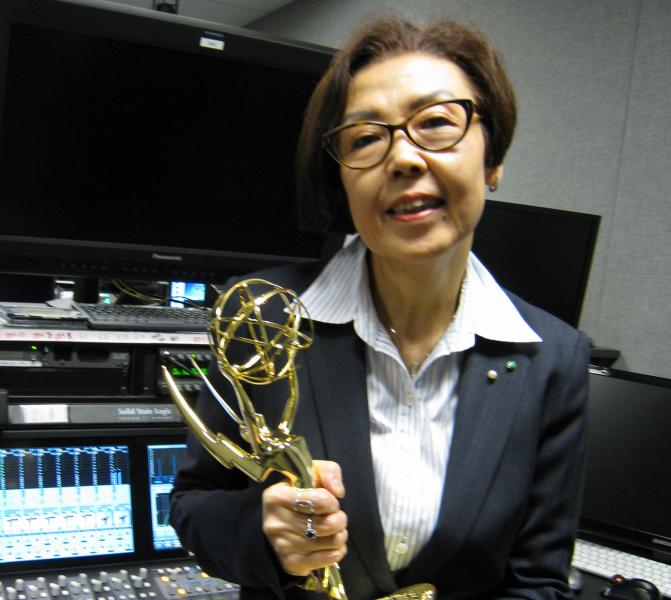Producing an Emmy
 It highlights mystery writer Dashiell Hammettʻs talents. It animates the life of painter Norman Rockwell. It peeks through the strings of Billie Jean Kingʻs tennis racket.
It highlights mystery writer Dashiell Hammettʻs talents. It animates the life of painter Norman Rockwell. It peeks through the strings of Billie Jean Kingʻs tennis racket.
The PBS series, American Masters, goes deep as it profiles individuals who have left an impression on American culture and society.
In the past 28 years, it has been nominated for more than 70 Emmy awards, winning 28. The most recent came in August, when Pacific University alumna Junko Tsunashima ’74, supervising producer for the show, received her first Emmy statue.
Tsunashima was born in Japan to a middle class family. Her father’s employer at the time transferred her family of four to Hong Kong for five years. They moved back to Japan when she was 10 — a hard transition, particularly for school.
“I did not know the Japanese custom, and my Japanese reading and writing skills were way behind that of my new Japanese classmates,” Tsunashima said.
When Tsunashima was 16, her father was transferred again, this time, to New York City, where she lives today.
Tsunashima applied to five schools across the United States, but Pacific University, recommended by her English tutor, seemed like the perfect place. Without visiting, she decided to attend Pacific in 1970.
“I had grown up in big cities: Hong Kong, Tokyo, and New York, so Forest Grove, where they rolled up the sidewalks around [eight at night] was quite a culture shock,” Tsunashima said. “Coming from a big high school, Pacific was a really good place for me, because I was able to try many things.”
As a communications major, she was involved with the television studio as well as the radio station.
“We were both communication majors and were doing similar things,” said friend Martha DeLong. “Senior year we even taught a TV production class together.”
Tsunashima dreamed of becoming a photographer for LIFE magazine and gained experienced editing and photographing for Pacific magazine. She filled her notebooks with poetry, which she submitted to several magazines and formed into songs for her guitar.
After junior year, she and DeLong drove across the country to secure internships in the Department of Interior and the National Education Association in Washington D.C., as well as the United Nations in New York.
Tsunashima went on to Cornell University, where she earned her master’s of professional studies in communication arts.
Her first job was with a Japanese television company that helped her receive a work visa.
“They would rent airways from local television stations and put Japanese programming on, and once a week I did a news program for five to 10 minutes,” Tsunashima said. “I translated some New York Times articles into Japanese, and I did a lot of photography as well as story coverage.”
It was her foothold into other production jobs.
In 2000, she started work as the producer for the culture and arts documentary unit for THIRTEEN, a New York public television station. In 2009, she moved to the American Masters unit. She was promoted to supervising producer last year.
As supervising producer, Tsunashima assists outside producers during the production time and receives the program and ancillary materials when they are finished. She manages the assets and makes them available not only to PBS but to publicists, web and social media producers, as well as others who need them. She is also responsible for submissions to award programs and festivals and for organizing requests for screenings of the programs.
“I like what I do, because American Masters brings high-quality profiles of American culture and art icons to the public,” Tsunashima said. “These programs never fail to show an aspect of the person that I never knew about.”
Outside of work, Tsunashima enjoys culinary pursuits.
“I’m a shameless foodie,” she said.
Her long time friend Mariko Numaguchi, also referred to as her “sister,” said Tsunashima is a gourmet cook.
“Life is too short to eat bland food for Junko,” Numaguchi said.
If given more time, Tsunashima said she would create a food blog, finish the novel she has started, and be engulfed in another mystery novel.
During holidays and vacations she enjoys visiting family in Japan and Hawai‘i.
Professionally, Tsunashima said she enjoys where she is now. She hopes to eventually have more input on the diversity and the creative aspects of the show.
Looking back, she said that Pacific was a big step on her path.
“I don't think that when I was at Pacific I consciously thought that I wanted to be in film production,” she said. “But looking back now, I realize that all my experiences led me to where I am today.”


